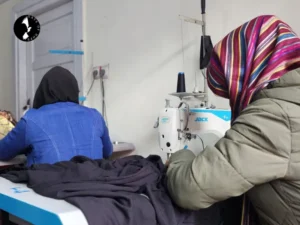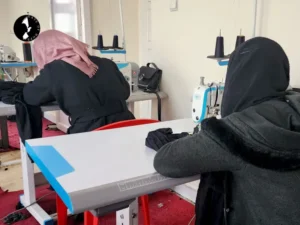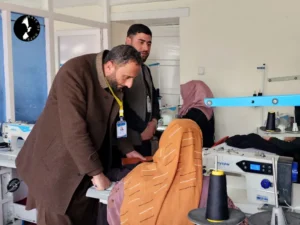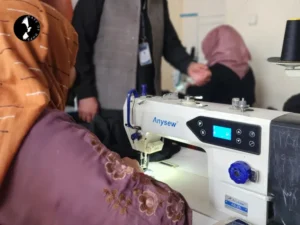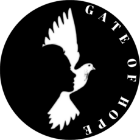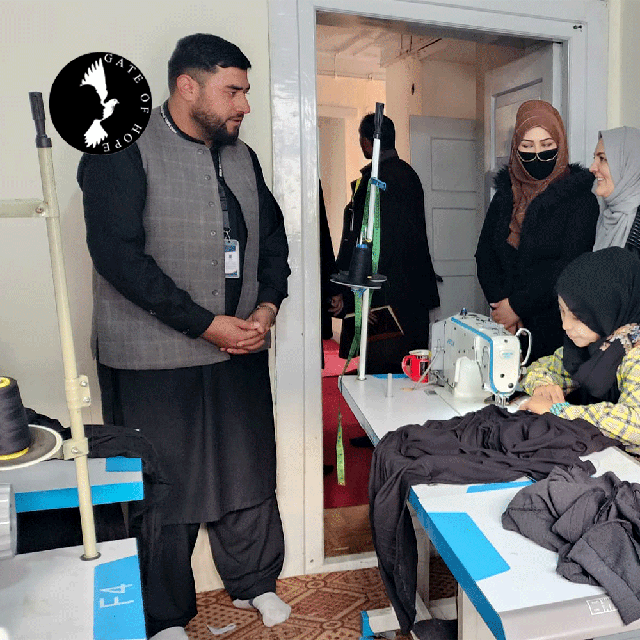In the heart of Kabul, a transformative story of empowerment and skill unfolds at the Shams Senai Women’s Sewing and Production Workshop. This remarkable workshop, a beacon of hope and resilience, recently hosted a visit from esteemed members of the Gate of Hope NGO, an organization dedicated to uplifting the people of Afghanistan. Among the distinguished guests were Mr. Ajmal Aryan, the professional head of Gate of Hope; Ms. Parmila Amiri, a representative of professional women in Kabul; and Dr. Mohammad Hamed Yousufzai, the professional deputy.
The visit was not just a ceremonial event; it was a melting pot of ideas, discussions, and a testament to the relentless spirit of the Afghan women who have turned this workshop into a hub of creativity and economic independence. The workshop serves as a vital platform where women learn and perfect the art of dressmaking, embroidery, bead embroidery, hand weaving, and even the unique craft of pickle production. These skills are more than just vocational training; they are tools of empowerment, enabling these women to weave their destiny with their own hands.
The products made in the workshop are not mere commodities; they embody the stories, dreams, and aspirations of the women who create them. They are sold through contracts or custom orders, symbolizing the blend of traditional craftsmanship with modern entrepreneurial spirit. The marketing system of these products is a subject of great importance, as it directly affects the livelihood of the artisans involved.
The visit by the Gate of Hope delegation was an opportunity for an exchange of ideas and insights into the operations of the workshop. Key topics discussed included the number of apprentices in the workshop, the variety and quality of products produced, the marketing strategies employed, and the challenges faced by the workshop and its artisans. This dialogue was crucial for understanding the ground realities and for planning future support and interventions.
Mr. Ajmal Aryan, representing the leadership of Gate of Hope, expressed profound appreciation for the achievements and activities of the women at the workshop. His words were not just of praise but also of commitment. He assured comprehensive support for the continuation and growth of their work, acknowledging the significant role these women play in not only supporting their families but also in contributing to the economic fabric of Afghanistan.
The visit culminated with a meaningful request by Ms. Shakera Shams, the head of the workshop. She articulated the need for several standard machines to expand the activities of the workshop. This request, diligently recorded in the report of the institution, highlights the ever-present need for resources and support to sustain and grow such empowering initiatives.
The visit by the Gate of Hope delegation to the Shams Senai Women’s Sewing and Production Workshop is a shining example of how targeted support and recognition can fuel the aspirations of women entrepreneurs. It underscores the importance of vocational training and skill development as powerful tools for economic empowerment and social change. The stories of these women, threading needles and weaving dreams, are not just about creating beautiful products; they are about stitching together a narrative of hope, resilience, and empowerment in a country striving for peace and prosperity.
As the journey of the Shams Senai Women’s Sewing and Production Workshop continues, supported by organizations like Gate of Hope, it stands as a testament to the strength and potential of Afghan women. Their hands, which once might have only held the threads of uncertainty, now confidently guide needles of change, crafting a future of possibilities and success.
In conclusion, the visit by the Gate of Hope to the Shams Senai workshop is more than just a gesture of solidarity; it is a step towards a future where Afghan women are not just participants but leaders in the economic and social revival of their country. The continued support for such initiatives is vital for nurturing an environment where women can thrive, create, and lead the way towards a brighter, more inclusive future for Afghanistan.
